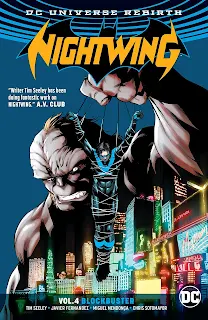Blockbuster collects two stories, one of which continues Seeley's Bludhaven world-building and one of which hearkens back to Seeley and Tom King's Grayson series. Though overall Seeley writes an apt Dick Grayson, these stories are equal parts strong and problematic, often ranging from one extreme to the other page by page. Again, the larger question becomes whether or not this matters -- with Seeley's story still largely in the set-up phase, clearly there's no room for a full denouement in one more volume, which means it falls to incoming writer Sam Humphries to ultimately determine whether Seeley's story is successful. I acknowledge that's not necessarily Humphries' responsibility, but my fear is the loser in all of this might end up being the reader.
[Review contains spoilers]
The "Blockbuster" story has the kind of sleazy inter-character politics that one wants from a Bludhaven story, and which made Seeley's Nightwing Vol. 2: Back to Bludhaven so good. Similarly, "Spyral" is basically a good mind-bending Grayson story, albeit with some more colorful costumes.
But whereas I have been high at times on the burgeoning relationship between Dick and Shawn "Defacer" Tsang, in their strife I don't think Seeley is as successful; the two quibbling for pages at a time over "you meant this but you said that," etc., comes off petty, not interesting. And of all of Grayson's dangling plotlines, I had thought Minos was relatively tied up, such to bring him back for Dick to go a couple rounds with Agent One and then put things basically back the way they were before seems in certain respects reductive. In only setting up the new Blockbuster, in teasing a change for Shawn that can't possibly play out fully in one more volume, in dabbling in Grayson without much consequence, the Nightwing title worrisomely seems to be spinning its wheels, perhaps in anticipation for Seeley's -- presumably unexpected -- departure.
What has the most potential here is Nightwing's conflict with the new Blockbuster (though again we have no assurances that'll stay in the forefront). Again, like the second-string villains in Back to Bludhaven, Seeley takes the framework of what Dixon had done before and de-ages and reinterprets it, positing Roland "Blockbuster" Desmond as a somewhat lower-level criminal now, a little farther back from his rise. This makes Dick and Desmond strange contemporaries in a way, two sons of Bludhaven coming at it from different angles, and tantalizingly they can sit down for a drink one moment and then do battle the next. I'm unsure about Dick as a blackjack dealer -- this feels flat to me, like Dick as a gym teacher, whereas Dixon's Dick-as-cop still seems the most full of possibilities -- but I'm curious if the intention is for Dick to become involved in Desmond's criminal enterprises, integrating elements of Devin Grayson's Nightwing run.
The "Spyral" arc does well in parallel storylines, both Nightwing and Huntress running afoul of corruption within their old organization and also Shawn being influenced by her old mentor Pigeon and the character Mouse dealing with the murder of boyfriend Giz for helping Nightwing. In all of these we see the characters giving in to their darker impulses, often due to the influence of others. If anything "good" should come of Dick and Shawn's breakup, that Shawn should be embroiled again in the damaged relationship she has with Pigeon (an analogue of course of Batman and Robin) is the most interesting to watch. At the same time, especially given the book's last scene, I fear we're going to have to endure more angst from Shawn, now tinged with jealousy. Clearly a character called "Defacer" was never going to be one for the ages, perhaps the least likely to continue past Seeley's run, and I'm concerned to see just how ill or melodramatically treated the character might be in Seeley's last remaining volume.
Still, I assuredly could never dismiss a book in which, in the span of an issue, Nightwing should dispatch the Superman villain Skyhook (kudos to Seeley for a deep dive), Crash (from Christopher Priest's Steel), Gog, Kid Amazo, and Strato and Snakepit late of Gene Luen Yang's Superman and New Super-Man. Not to mention the presence of Scott Snyder's delightfully weird Tiger Shark, whom I'm glad no one has forgotten is really a Nightwing villain on account of who was wearing the Bat-cowl when this iteration of Tiger Shark first debuted. Artists in this book do a bang-up job, including Miguel Mendonca on the villains sequence and Javier Fernandez doing his best Grayson impression with some creative paneling.
Support Collected Editions -- Purchase Nightwing Vol. 4: Blockbuster
Tim Seeley's Nightwing continues to be the best Nightwing we've had in a while and certainly faithful to the Grayson that preceded this. Nightwing Vol. 4: Blockbuster is no slouch by any measure, but in comparison to the greatness that has sometimes surrounded this title and this creator, this one feels like its coasting a bit. I'm hopeful Seeley has something truly astounding planned for his finale.
[Includes original and variant covers, inked pages]
Summary
Reviewer
Collected Editions
Review Date
Reviewed Item
Nightwing Vol. 4: Blockbuster
Author Rating
4 (scale of 1 to 5)

Comments
To post a comment, you may need to temporarily allow "cross-site tracking" in your browser of choice.